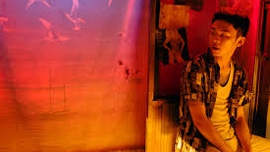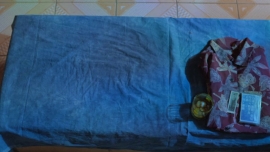"If I think about the future of cinema as art, I shiver" (Y. Ozu, 1959)
FUTURE OF CINEMA (2) - Long Day’s Journey Into Night (Bi Gan)
Sunday, 02 December 2018 19:00Daniela Turco
Kaili Blues (Bi Gan)
Tuesday, 23 February 2016 12:00The Sort of Song That Plays Only in Your Dreams
James Lattimer
With every first film you watch, you enter unchartered territory. You have no idea what awaits you, you have no experience to draw on and there’s nothing to guide you on your way. You can only give yourself up to the journey and hope the filmmaker is skilled at marking out the terrain; every good filmmaker must also be a good mapmaker. But how do you make a good map if you’ve never made one before? If your map draws too heavily on established routes, the trip is unlikely to be memorable; if it leads too far out into the wilderness, you’re going to lose people along the way. The best maps take you by the hand but still allow you to wander, they give structure but they do not dictate, they mark out paths but allow them to lead anywhere.
Bi Gan’s Kaili Blues spends most of its time charting a series of woozily interconnected trips, between Kaili and Zhenyuan, between past and present, between all the shifting layers of a dream. If, as the Diamond Sutra quote that opens the film suggests, neither the past, present nor future mind can be found, Kaili Blues is about tracking the sublimely futile process of looking for it. This is a place where you see the blue cassette long before it’s actually given to you, where you watch the train that will later return you to Kaili pass through the room in front of you, where there are so many different shots of protagonist Chen Sheng with his eyes closed it’s impossible to determine where one of his dreams stops and the next begins.
So the terrain Bi chooses to map out is an ambitious one. Rather than sticking with the standard three-dimensions of space, he augments his selected swathe of Guizhou province with the additional dimension of time, smearing the boundaries yet further by letting everything be governed by the unruly laws of Chen’s slumbering mind; we shouldn’t forgot he’s a poet after all. It’s thus often hard to say what exactly connects each individual scene, with the temporal, the causal, the spatial or the associative providing equally valid answers, if indeed there is any definitive answer at all. A nostalgic story of keeping hands warm with a torch suddenly cuts to a shot of two unidentifiable hands bathed in red light and tightly clasped together, a motorcycle repair is interrupted by an impromptu piece of bulldozer ballet and when Chen and his nephew Weiwei take a ride in an overgrown amusement park, the camera shows no qualms in detaching itself from their perspective. Just like in Chen’s poems, it’s not about their meaning, it’s about their rhythm.
It’s easy to imagine how all this unbounded freedom might get out of hand and in lesser hands it might, but Bi proves himself to be nothing if not a master mapmaker. His approach to cartography is not about ploughing familiar furrows or leading you up the garden path, but rather scattering the terrain with enough signposts to let you make your own way. These signposts are what other films would relegate to the status of mere objects, they are points of constant reference content to lurk in the background, even as they cut across four whole dimensions and an entire subjectivity. Each insignificant when taken by itself, together they form a lattice that reaches every corner of the film; no matter when or where you might end up, the objects around you offer repose.
Chen is given three objects to take with him on his way to Zhenyuan - the photograph of a friend of his elderly colleague Guang Lian, the cassette he once gave to her and the shirt she agreed to buy for him - and each get its chance to shine. The contents of the cassette soundtrack Chen’s trip to his mother’s grave; once two replacement buttons have been sewn back on, the shirt is a perfectly familiar outfit to wear in a perfectly unfamiliar place; the photograph is the one way for Chen to know he’s finally reached his goal. These three objects are flanked by countless others: the white dogs that may or may not have taught the locals how to fuck, myriad motorbikes and mirrorballs, blue shoes carried along by the current, pool tables that pop up again despite the camera having shaken off the protagonist, endlessly proliferating watches and clocks: drawn on wrists, painted on walls, covered with a scattering of buttons, spinning back through time as a train passes alongside.
And if all these tangible objects aren’t enough to help you get your bearings, there are more than enough intangible ones on hand to do the same job: the wild men covered in brown hair that are never seen, but seem to be on everyone’s lips, the apparently unmotivated camera movements in the first half of the film whose job it is to prepare you for its wild wanderings in the second, all the facts and figures that make up Kaili stored in the head of a girl who carries the same name as Chen’s wife, her recitations only halted by someone else who also happens to be called Weiwei.
While all these recurring elements function perfectly as signposts, they also resemble the motifs of a perfectly composed song; it’s not for nothing that the film is called Kaili Blues. Perhaps that’s Bi’s most singular achievement, his willingness to rely on rhythm to illuminate an unchartered terrain. How many other first features can you say that about? Much like Chen’s spontaneous final performance, Bi’s is a melancholy number, the perfect soundtrack to a life full of regret, a song that echoes across misty roads, crumbing buildings, dark tunnels and deep valleys, the sort of song that plays only in your dreams.
Ultimi articoli pubblicati
- 2025-03-24 Chime/Cloud/Serpent’s Path (Kurosawa Kiyoshi)
- 2025-03-24 Abiding Nowhere (Tsai Ming-liang)
- 2025-03-24 The Box Man (Gakuryū Ishii)
- 2025-03-24 Grand Tour (Miguel Gomes)



